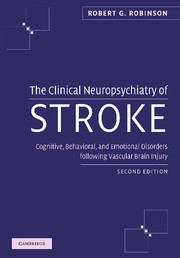 The Clinical Neuropsychiatry of Stroke
The Clinical Neuropsychiatry of Stroke Book contents
- Frontmatter
- Contents
- Preface
- Part I Introduction
- Part II Poststroke depression
- Part III Poststroke mania
- 24 Prevalence and clinical symptoms
- 25 Clinical and lesion correlates of poststroke mania
- 26 Bipolar disorder following stroke
- 27 Mechanism of mania following stroke
- 28 Treatment of mania following stroke
- Part IV Poststroke anxiety disorders
- Part V Other poststroke disorders
- Index
26 - Bipolar disorder following stroke
from Part III - Poststroke mania
Published online by Cambridge University Press: 01 October 2009
- Frontmatter
- Contents
- Preface
- Part I Introduction
- Part II Poststroke depression
- Part III Poststroke mania
- 24 Prevalence and clinical symptoms
- 25 Clinical and lesion correlates of poststroke mania
- 26 Bipolar disorder following stroke
- 27 Mechanism of mania following stroke
- 28 Treatment of mania following stroke
- Part IV Poststroke anxiety disorders
- Part V Other poststroke disorders
- Index
Summary
As indicated in the previous chapter, a significant number of patients with secondary mania were also found to have episodes of depression. In contrast, however, other patients with secondary mania did not have episodes of depression within the period of study or prior to the stroke. We examined patients with bipolar disorder and compared them to patients with secondary mania but no evidence of depressive episodes (Starkstein et al. 1991).
The most obvious concern in patients with mania but without episodes of depression is whether sufficient follow-up had been obtained to identify the existence of a bipolar disorder. The diagnostic categories of Diagnostic and Statistical Manual of Mental Disorder (DSM-IV) (see Chapter 5) do not include unipolar mania and once a patient has had an episode of mania they are presumed to have a bipolar disorder. Although one cannot be sure that a patient with a single or recurrent episodes of mania will not have depression (similarly one cannot be sure that patients with unipolar depression will not have an episode of mania in the future), all of the patients included in the bipolar disorder associated with brain injury had depression prior to the onset of mania. Patients with mania had variable amounts of follow-up but none of them had depression prior to onset of mania or at any time following the episode of mania.
- Type
- Chapter
- Information
- The Clinical Neuropsychiatry of StrokeCognitive, Behavioral and Emotional Disorders following Vascular Brain Injury, pp. 300 - 305Publisher: Cambridge University PressPrint publication year: 2006


